Taxation Law: Improving Compliance in the Shared Economy
VerifiedAdded on 2023/03/20
|10
|2830
|52
Essay
AI Summary
This essay delves into the realm of taxation law, specifically examining the challenges and opportunities presented by the shared economy in Australia. It analyzes the degree to which providers like Uber drivers, Airbnb hosts, and others comply with Australian income tax laws. The essay highlights the current issues, such as the lack of transparency and the difficulties the ATO faces in ensuring accurate reporting. It explores the existing preparations and encouraging compliance with Australian income tax laws. The essay then proposes and discusses in detail at least two ways in which compliance could be improved, drawing from the provided article and other relevant sources. These recommendations likely include enhanced reporting requirements, data matching, and modifications to the tax installment regime, along with how these measures can improve the overall tax obligations of shared economy providers and increase government revenue. The essay provides a comprehensive overview of the topic, offering insights into how the Australian taxation system can adapt to the evolving landscape of the gig economy.
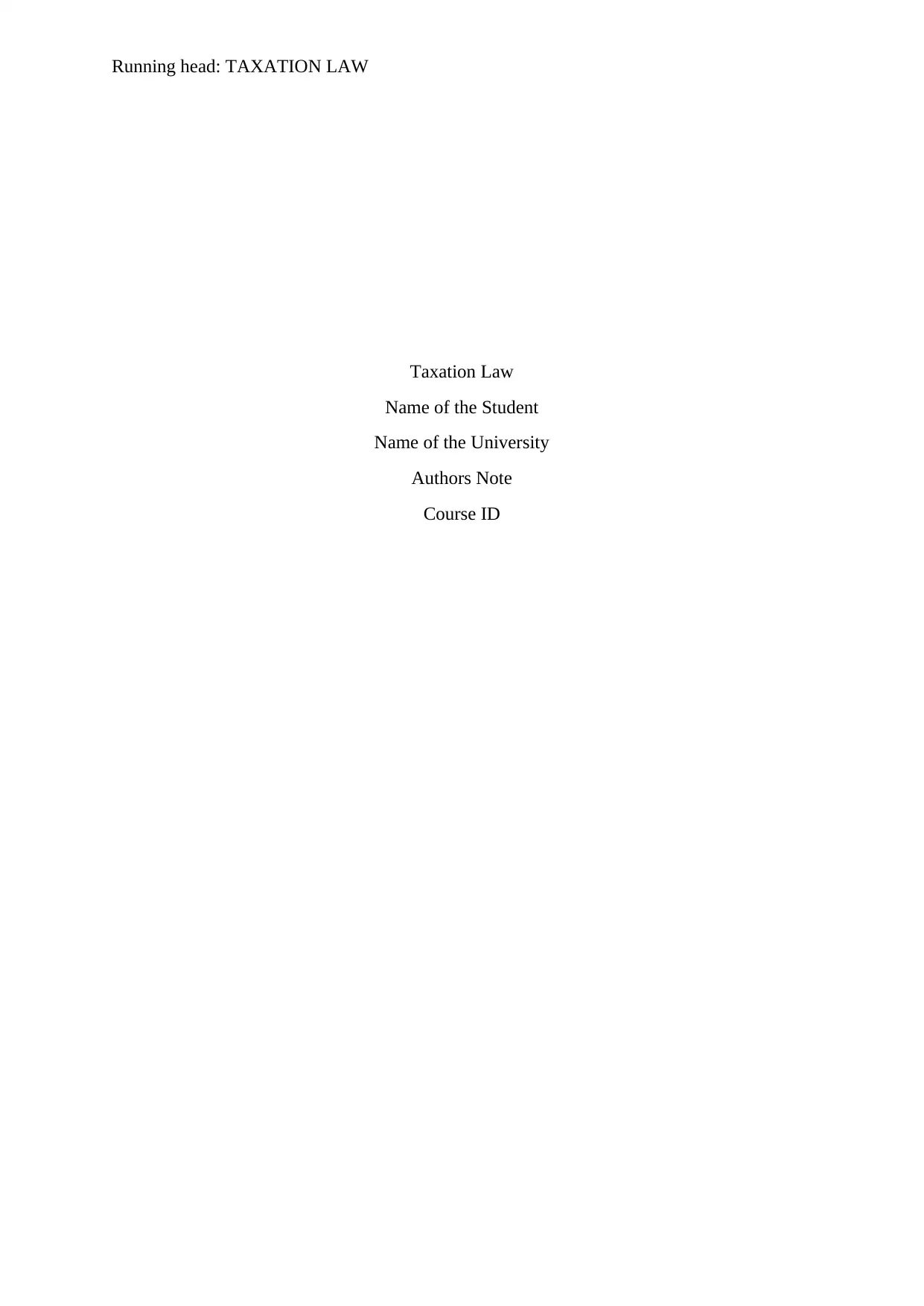
Running head: TAXATION LAW
Taxation Law
Name of the Student
Name of the University
Authors Note
Course ID
Taxation Law
Name of the Student
Name of the University
Authors Note
Course ID
Paraphrase This Document
Need a fresh take? Get an instant paraphrase of this document with our AI Paraphraser
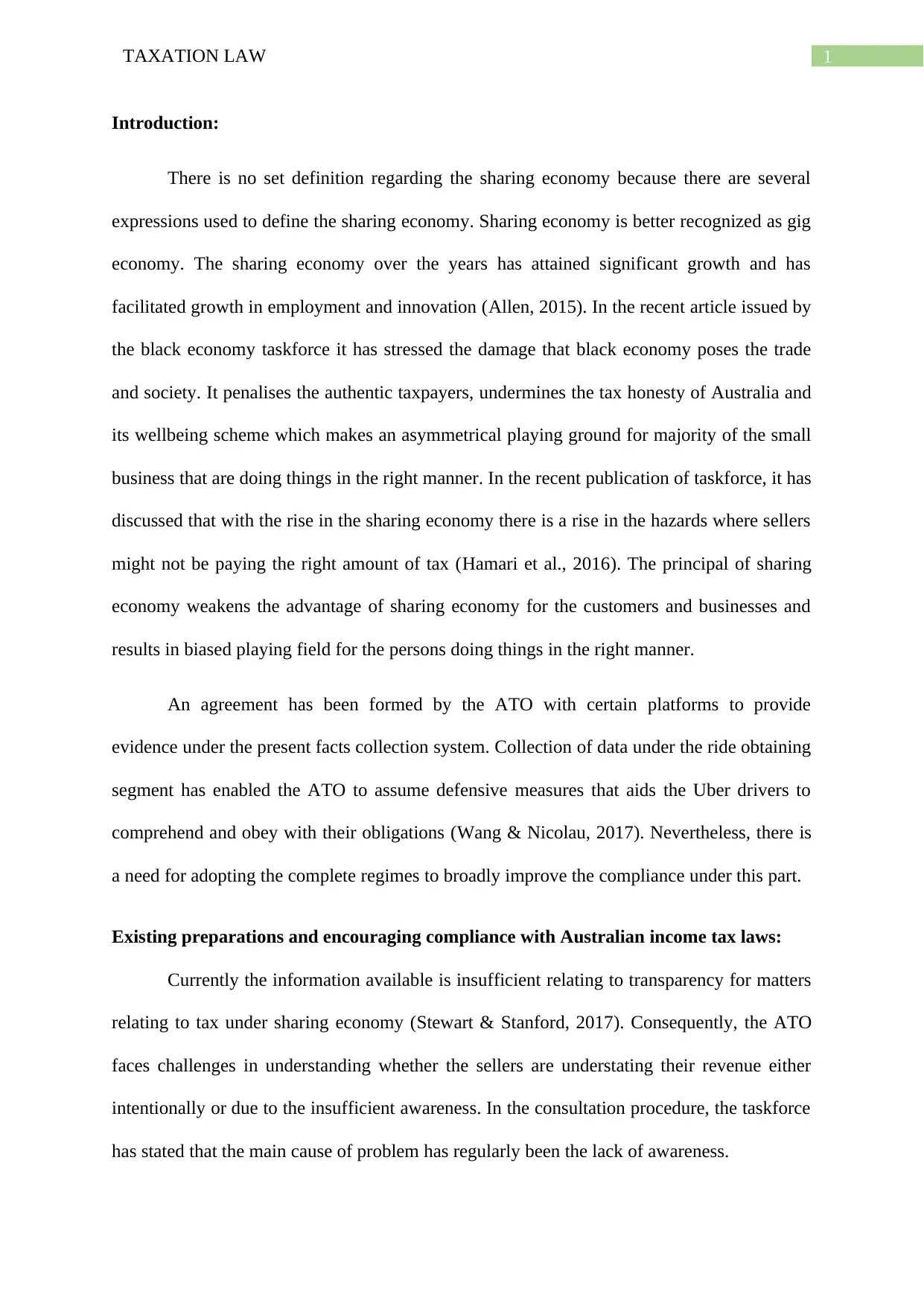
1TAXATION LAW
Introduction:
There is no set definition regarding the sharing economy because there are several
expressions used to define the sharing economy. Sharing economy is better recognized as gig
economy. The sharing economy over the years has attained significant growth and has
facilitated growth in employment and innovation (Allen, 2015). In the recent article issued by
the black economy taskforce it has stressed the damage that black economy poses the trade
and society. It penalises the authentic taxpayers, undermines the tax honesty of Australia and
its wellbeing scheme which makes an asymmetrical playing ground for majority of the small
business that are doing things in the right manner. In the recent publication of taskforce, it has
discussed that with the rise in the sharing economy there is a rise in the hazards where sellers
might not be paying the right amount of tax (Hamari et al., 2016). The principal of sharing
economy weakens the advantage of sharing economy for the customers and businesses and
results in biased playing field for the persons doing things in the right manner.
An agreement has been formed by the ATO with certain platforms to provide
evidence under the present facts collection system. Collection of data under the ride obtaining
segment has enabled the ATO to assume defensive measures that aids the Uber drivers to
comprehend and obey with their obligations (Wang & Nicolau, 2017). Nevertheless, there is
a need for adopting the complete regimes to broadly improve the compliance under this part.
Existing preparations and encouraging compliance with Australian income tax laws:
Currently the information available is insufficient relating to transparency for matters
relating to tax under sharing economy (Stewart & Stanford, 2017). Consequently, the ATO
faces challenges in understanding whether the sellers are understating their revenue either
intentionally or due to the insufficient awareness. In the consultation procedure, the taskforce
has stated that the main cause of problem has regularly been the lack of awareness.
Introduction:
There is no set definition regarding the sharing economy because there are several
expressions used to define the sharing economy. Sharing economy is better recognized as gig
economy. The sharing economy over the years has attained significant growth and has
facilitated growth in employment and innovation (Allen, 2015). In the recent article issued by
the black economy taskforce it has stressed the damage that black economy poses the trade
and society. It penalises the authentic taxpayers, undermines the tax honesty of Australia and
its wellbeing scheme which makes an asymmetrical playing ground for majority of the small
business that are doing things in the right manner. In the recent publication of taskforce, it has
discussed that with the rise in the sharing economy there is a rise in the hazards where sellers
might not be paying the right amount of tax (Hamari et al., 2016). The principal of sharing
economy weakens the advantage of sharing economy for the customers and businesses and
results in biased playing field for the persons doing things in the right manner.
An agreement has been formed by the ATO with certain platforms to provide
evidence under the present facts collection system. Collection of data under the ride obtaining
segment has enabled the ATO to assume defensive measures that aids the Uber drivers to
comprehend and obey with their obligations (Wang & Nicolau, 2017). Nevertheless, there is
a need for adopting the complete regimes to broadly improve the compliance under this part.
Existing preparations and encouraging compliance with Australian income tax laws:
Currently the information available is insufficient relating to transparency for matters
relating to tax under sharing economy (Stewart & Stanford, 2017). Consequently, the ATO
faces challenges in understanding whether the sellers are understating their revenue either
intentionally or due to the insufficient awareness. In the consultation procedure, the taskforce
has stated that the main cause of problem has regularly been the lack of awareness.
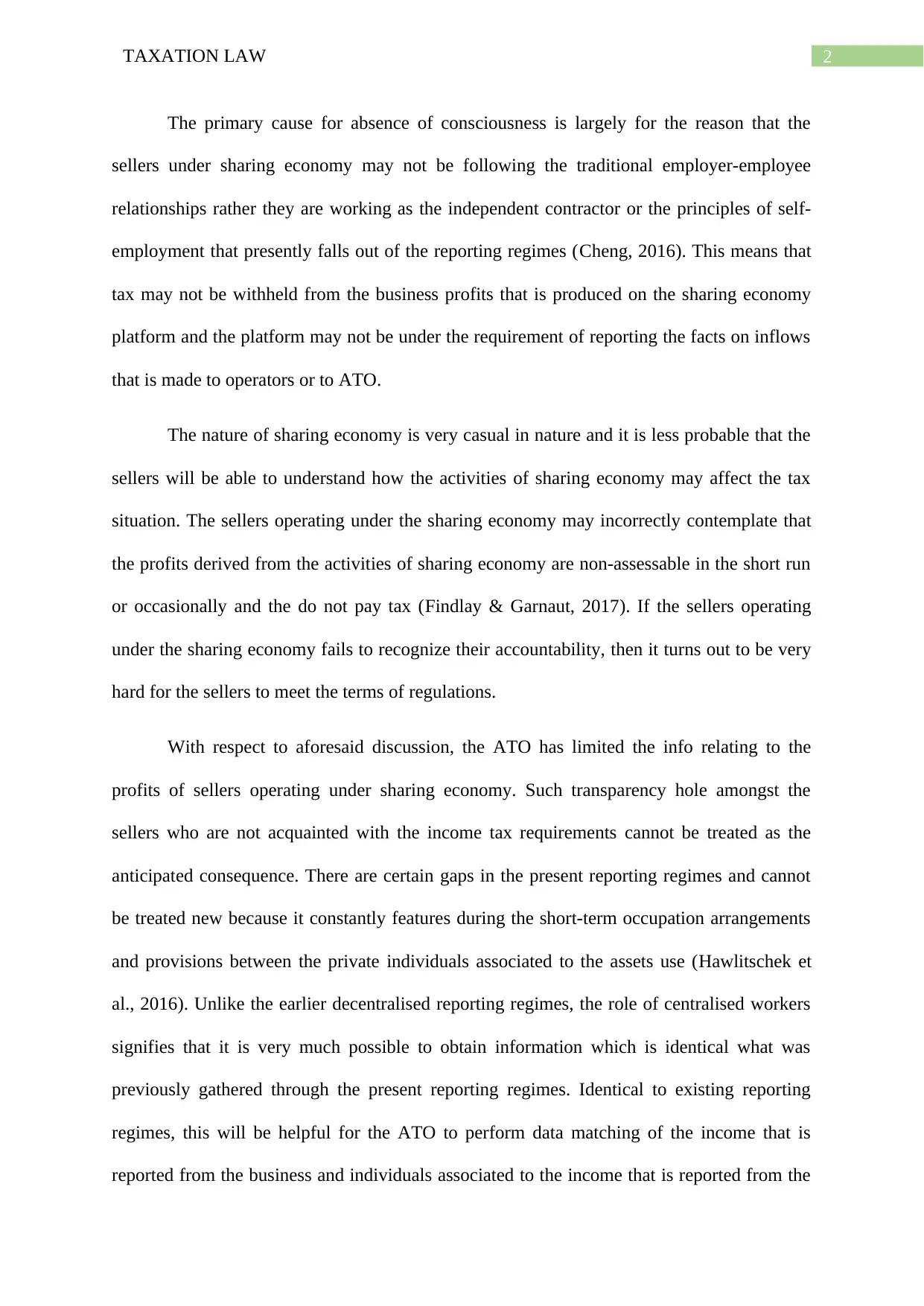
2TAXATION LAW
The primary cause for absence of consciousness is largely for the reason that the
sellers under sharing economy may not be following the traditional employer-employee
relationships rather they are working as the independent contractor or the principles of self-
employment that presently falls out of the reporting regimes (Cheng, 2016). This means that
tax may not be withheld from the business profits that is produced on the sharing economy
platform and the platform may not be under the requirement of reporting the facts on inflows
that is made to operators or to ATO.
The nature of sharing economy is very casual in nature and it is less probable that the
sellers will be able to understand how the activities of sharing economy may affect the tax
situation. The sellers operating under the sharing economy may incorrectly contemplate that
the profits derived from the activities of sharing economy are non-assessable in the short run
or occasionally and the do not pay tax (Findlay & Garnaut, 2017). If the sellers operating
under the sharing economy fails to recognize their accountability, then it turns out to be very
hard for the sellers to meet the terms of regulations.
With respect to aforesaid discussion, the ATO has limited the info relating to the
profits of sellers operating under sharing economy. Such transparency hole amongst the
sellers who are not acquainted with the income tax requirements cannot be treated as the
anticipated consequence. There are certain gaps in the present reporting regimes and cannot
be treated new because it constantly features during the short-term occupation arrangements
and provisions between the private individuals associated to the assets use (Hawlitschek et
al., 2016). Unlike the earlier decentralised reporting regimes, the role of centralised workers
signifies that it is very much possible to obtain information which is identical what was
previously gathered through the present reporting regimes. Identical to existing reporting
regimes, this will be helpful for the ATO to perform data matching of the income that is
reported from the business and individuals associated to the income that is reported from the
The primary cause for absence of consciousness is largely for the reason that the
sellers under sharing economy may not be following the traditional employer-employee
relationships rather they are working as the independent contractor or the principles of self-
employment that presently falls out of the reporting regimes (Cheng, 2016). This means that
tax may not be withheld from the business profits that is produced on the sharing economy
platform and the platform may not be under the requirement of reporting the facts on inflows
that is made to operators or to ATO.
The nature of sharing economy is very casual in nature and it is less probable that the
sellers will be able to understand how the activities of sharing economy may affect the tax
situation. The sellers operating under the sharing economy may incorrectly contemplate that
the profits derived from the activities of sharing economy are non-assessable in the short run
or occasionally and the do not pay tax (Findlay & Garnaut, 2017). If the sellers operating
under the sharing economy fails to recognize their accountability, then it turns out to be very
hard for the sellers to meet the terms of regulations.
With respect to aforesaid discussion, the ATO has limited the info relating to the
profits of sellers operating under sharing economy. Such transparency hole amongst the
sellers who are not acquainted with the income tax requirements cannot be treated as the
anticipated consequence. There are certain gaps in the present reporting regimes and cannot
be treated new because it constantly features during the short-term occupation arrangements
and provisions between the private individuals associated to the assets use (Hawlitschek et
al., 2016). Unlike the earlier decentralised reporting regimes, the role of centralised workers
signifies that it is very much possible to obtain information which is identical what was
previously gathered through the present reporting regimes. Identical to existing reporting
regimes, this will be helpful for the ATO to perform data matching of the income that is
reported from the business and individuals associated to the income that is reported from the
⊘ This is a preview!⊘
Do you want full access?
Subscribe today to unlock all pages.

Trusted by 1+ million students worldwide
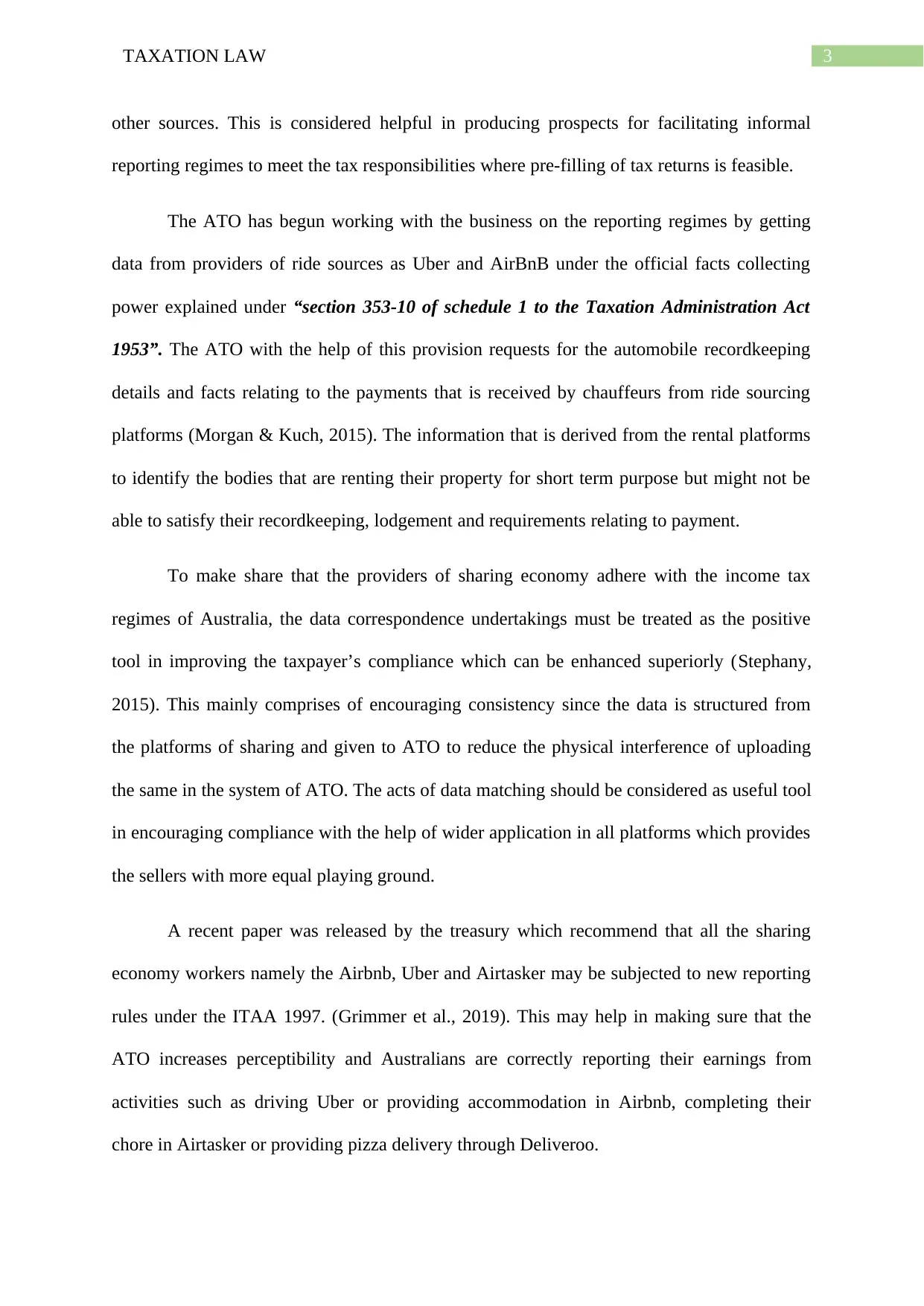
3TAXATION LAW
other sources. This is considered helpful in producing prospects for facilitating informal
reporting regimes to meet the tax responsibilities where pre-filling of tax returns is feasible.
The ATO has begun working with the business on the reporting regimes by getting
data from providers of ride sources as Uber and AirBnB under the official facts collecting
power explained under “section 353-10 of schedule 1 to the Taxation Administration Act
1953”. The ATO with the help of this provision requests for the automobile recordkeeping
details and facts relating to the payments that is received by chauffeurs from ride sourcing
platforms (Morgan & Kuch, 2015). The information that is derived from the rental platforms
to identify the bodies that are renting their property for short term purpose but might not be
able to satisfy their recordkeeping, lodgement and requirements relating to payment.
To make share that the providers of sharing economy adhere with the income tax
regimes of Australia, the data correspondence undertakings must be treated as the positive
tool in improving the taxpayer’s compliance which can be enhanced superiorly (Stephany,
2015). This mainly comprises of encouraging consistency since the data is structured from
the platforms of sharing and given to ATO to reduce the physical interference of uploading
the same in the system of ATO. The acts of data matching should be considered as useful tool
in encouraging compliance with the help of wider application in all platforms which provides
the sellers with more equal playing ground.
A recent paper was released by the treasury which recommend that all the sharing
economy workers namely the Airbnb, Uber and Airtasker may be subjected to new reporting
rules under the ITAA 1997. (Grimmer et al., 2019). This may help in making sure that the
ATO increases perceptibility and Australians are correctly reporting their earnings from
activities such as driving Uber or providing accommodation in Airbnb, completing their
chore in Airtasker or providing pizza delivery through Deliveroo.
other sources. This is considered helpful in producing prospects for facilitating informal
reporting regimes to meet the tax responsibilities where pre-filling of tax returns is feasible.
The ATO has begun working with the business on the reporting regimes by getting
data from providers of ride sources as Uber and AirBnB under the official facts collecting
power explained under “section 353-10 of schedule 1 to the Taxation Administration Act
1953”. The ATO with the help of this provision requests for the automobile recordkeeping
details and facts relating to the payments that is received by chauffeurs from ride sourcing
platforms (Morgan & Kuch, 2015). The information that is derived from the rental platforms
to identify the bodies that are renting their property for short term purpose but might not be
able to satisfy their recordkeeping, lodgement and requirements relating to payment.
To make share that the providers of sharing economy adhere with the income tax
regimes of Australia, the data correspondence undertakings must be treated as the positive
tool in improving the taxpayer’s compliance which can be enhanced superiorly (Stephany,
2015). This mainly comprises of encouraging consistency since the data is structured from
the platforms of sharing and given to ATO to reduce the physical interference of uploading
the same in the system of ATO. The acts of data matching should be considered as useful tool
in encouraging compliance with the help of wider application in all platforms which provides
the sellers with more equal playing ground.
A recent paper was released by the treasury which recommend that all the sharing
economy workers namely the Airbnb, Uber and Airtasker may be subjected to new reporting
rules under the ITAA 1997. (Grimmer et al., 2019). This may help in making sure that the
ATO increases perceptibility and Australians are correctly reporting their earnings from
activities such as driving Uber or providing accommodation in Airbnb, completing their
chore in Airtasker or providing pizza delivery through Deliveroo.
Paraphrase This Document
Need a fresh take? Get an instant paraphrase of this document with our AI Paraphraser
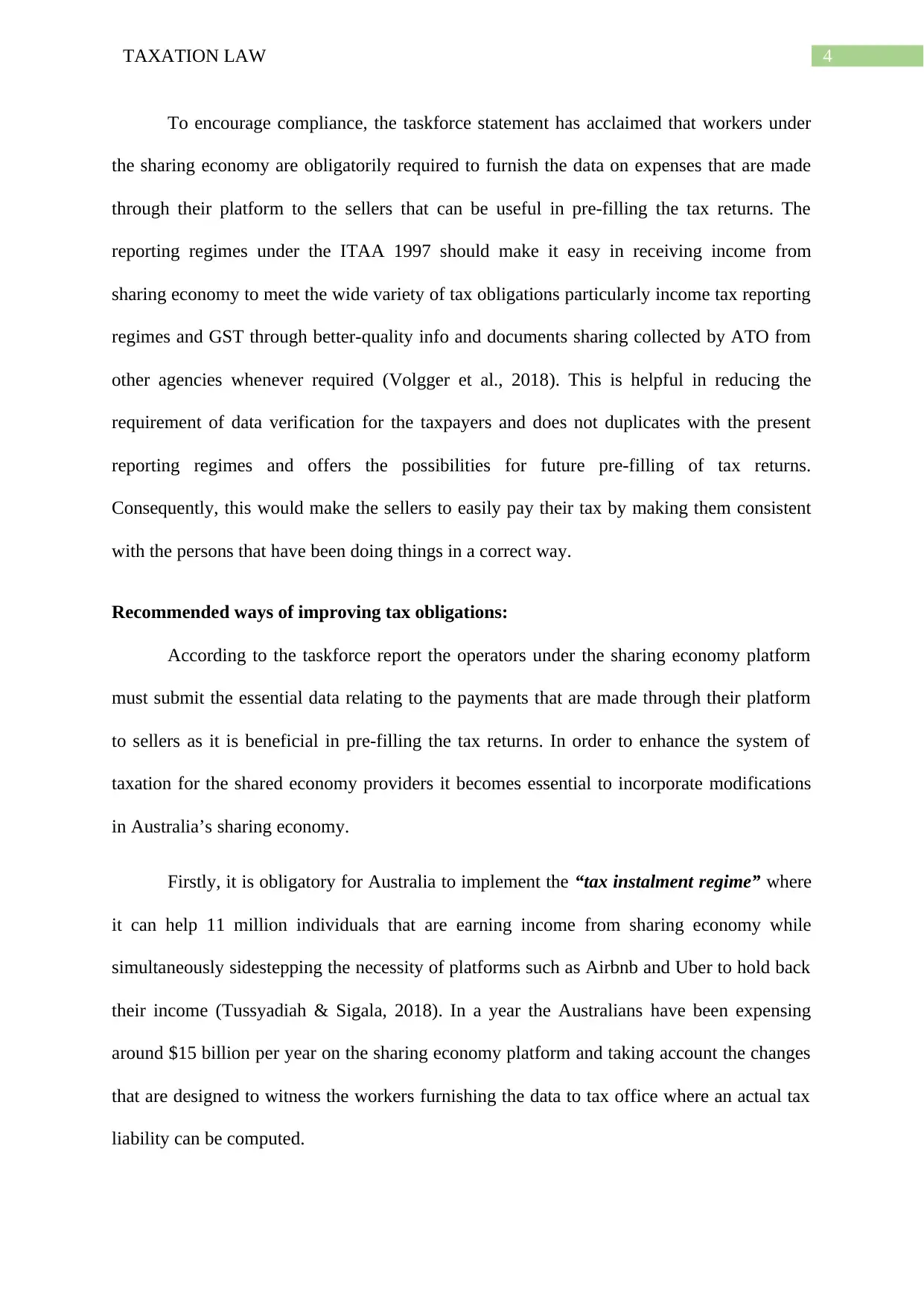
4TAXATION LAW
To encourage compliance, the taskforce statement has acclaimed that workers under
the sharing economy are obligatorily required to furnish the data on expenses that are made
through their platform to the sellers that can be useful in pre-filling the tax returns. The
reporting regimes under the ITAA 1997 should make it easy in receiving income from
sharing economy to meet the wide variety of tax obligations particularly income tax reporting
regimes and GST through better-quality info and documents sharing collected by ATO from
other agencies whenever required (Volgger et al., 2018). This is helpful in reducing the
requirement of data verification for the taxpayers and does not duplicates with the present
reporting regimes and offers the possibilities for future pre-filling of tax returns.
Consequently, this would make the sellers to easily pay their tax by making them consistent
with the persons that have been doing things in a correct way.
Recommended ways of improving tax obligations:
According to the taskforce report the operators under the sharing economy platform
must submit the essential data relating to the payments that are made through their platform
to sellers as it is beneficial in pre-filling the tax returns. In order to enhance the system of
taxation for the shared economy providers it becomes essential to incorporate modifications
in Australia’s sharing economy.
Firstly, it is obligatory for Australia to implement the “tax instalment regime” where
it can help 11 million individuals that are earning income from sharing economy while
simultaneously sidestepping the necessity of platforms such as Airbnb and Uber to hold back
their income (Tussyadiah & Sigala, 2018). In a year the Australians have been expensing
around $15 billion per year on the sharing economy platform and taking account the changes
that are designed to witness the workers furnishing the data to tax office where an actual tax
liability can be computed.
To encourage compliance, the taskforce statement has acclaimed that workers under
the sharing economy are obligatorily required to furnish the data on expenses that are made
through their platform to the sellers that can be useful in pre-filling the tax returns. The
reporting regimes under the ITAA 1997 should make it easy in receiving income from
sharing economy to meet the wide variety of tax obligations particularly income tax reporting
regimes and GST through better-quality info and documents sharing collected by ATO from
other agencies whenever required (Volgger et al., 2018). This is helpful in reducing the
requirement of data verification for the taxpayers and does not duplicates with the present
reporting regimes and offers the possibilities for future pre-filling of tax returns.
Consequently, this would make the sellers to easily pay their tax by making them consistent
with the persons that have been doing things in a correct way.
Recommended ways of improving tax obligations:
According to the taskforce report the operators under the sharing economy platform
must submit the essential data relating to the payments that are made through their platform
to sellers as it is beneficial in pre-filling the tax returns. In order to enhance the system of
taxation for the shared economy providers it becomes essential to incorporate modifications
in Australia’s sharing economy.
Firstly, it is obligatory for Australia to implement the “tax instalment regime” where
it can help 11 million individuals that are earning income from sharing economy while
simultaneously sidestepping the necessity of platforms such as Airbnb and Uber to hold back
their income (Tussyadiah & Sigala, 2018). In a year the Australians have been expensing
around $15 billion per year on the sharing economy platform and taking account the changes
that are designed to witness the workers furnishing the data to tax office where an actual tax
liability can be computed.
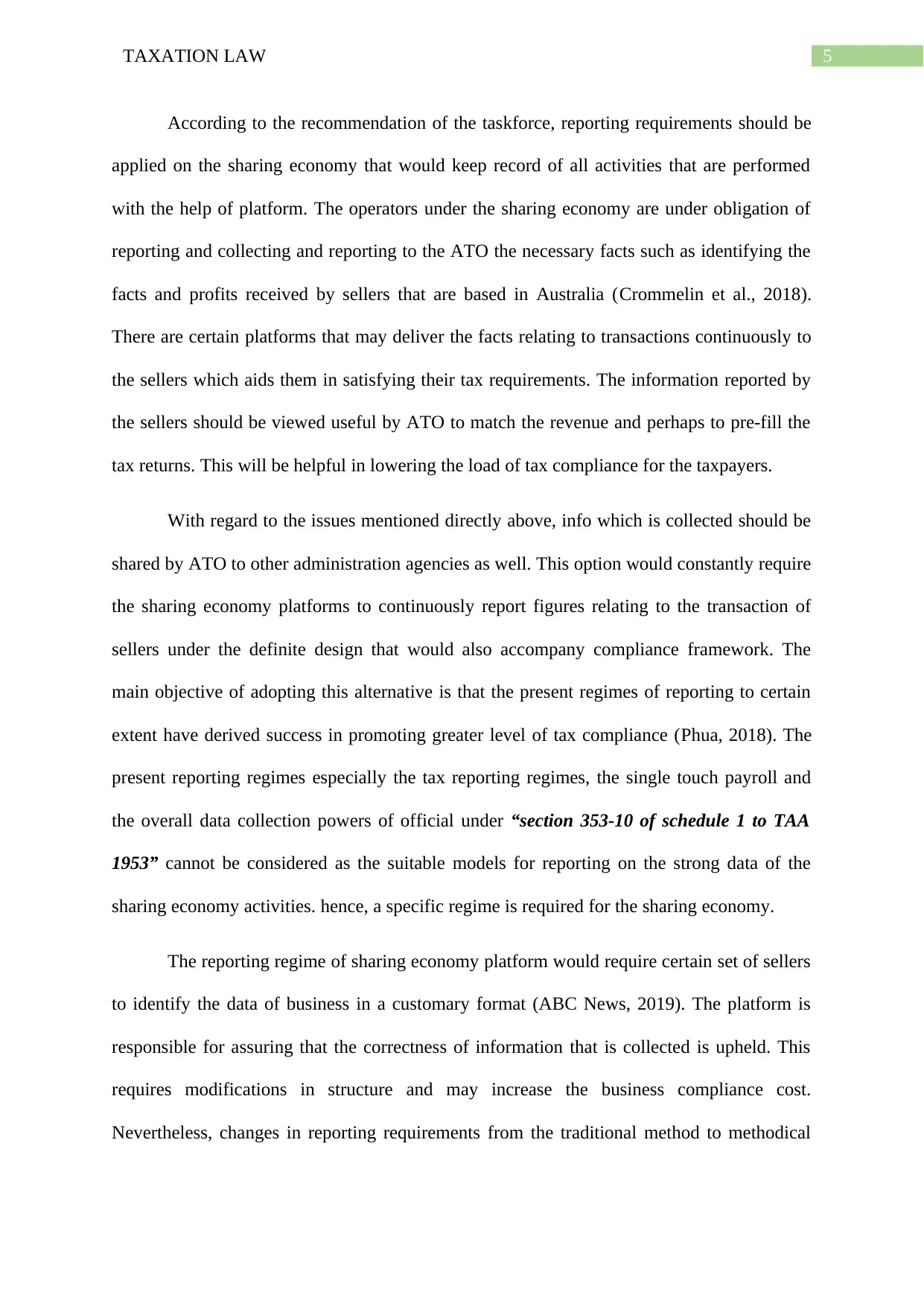
5TAXATION LAW
According to the recommendation of the taskforce, reporting requirements should be
applied on the sharing economy that would keep record of all activities that are performed
with the help of platform. The operators under the sharing economy are under obligation of
reporting and collecting and reporting to the ATO the necessary facts such as identifying the
facts and profits received by sellers that are based in Australia (Crommelin et al., 2018).
There are certain platforms that may deliver the facts relating to transactions continuously to
the sellers which aids them in satisfying their tax requirements. The information reported by
the sellers should be viewed useful by ATO to match the revenue and perhaps to pre-fill the
tax returns. This will be helpful in lowering the load of tax compliance for the taxpayers.
With regard to the issues mentioned directly above, info which is collected should be
shared by ATO to other administration agencies as well. This option would constantly require
the sharing economy platforms to continuously report figures relating to the transaction of
sellers under the definite design that would also accompany compliance framework. The
main objective of adopting this alternative is that the present regimes of reporting to certain
extent have derived success in promoting greater level of tax compliance (Phua, 2018). The
present reporting regimes especially the tax reporting regimes, the single touch payroll and
the overall data collection powers of official under “section 353-10 of schedule 1 to TAA
1953” cannot be considered as the suitable models for reporting on the strong data of the
sharing economy activities. hence, a specific regime is required for the sharing economy.
The reporting regime of sharing economy platform would require certain set of sellers
to identify the data of business in a customary format (ABC News, 2019). The platform is
responsible for assuring that the correctness of information that is collected is upheld. This
requires modifications in structure and may increase the business compliance cost.
Nevertheless, changes in reporting requirements from the traditional method to methodical
According to the recommendation of the taskforce, reporting requirements should be
applied on the sharing economy that would keep record of all activities that are performed
with the help of platform. The operators under the sharing economy are under obligation of
reporting and collecting and reporting to the ATO the necessary facts such as identifying the
facts and profits received by sellers that are based in Australia (Crommelin et al., 2018).
There are certain platforms that may deliver the facts relating to transactions continuously to
the sellers which aids them in satisfying their tax requirements. The information reported by
the sellers should be viewed useful by ATO to match the revenue and perhaps to pre-fill the
tax returns. This will be helpful in lowering the load of tax compliance for the taxpayers.
With regard to the issues mentioned directly above, info which is collected should be
shared by ATO to other administration agencies as well. This option would constantly require
the sharing economy platforms to continuously report figures relating to the transaction of
sellers under the definite design that would also accompany compliance framework. The
main objective of adopting this alternative is that the present regimes of reporting to certain
extent have derived success in promoting greater level of tax compliance (Phua, 2018). The
present reporting regimes especially the tax reporting regimes, the single touch payroll and
the overall data collection powers of official under “section 353-10 of schedule 1 to TAA
1953” cannot be considered as the suitable models for reporting on the strong data of the
sharing economy activities. hence, a specific regime is required for the sharing economy.
The reporting regime of sharing economy platform would require certain set of sellers
to identify the data of business in a customary format (ABC News, 2019). The platform is
responsible for assuring that the correctness of information that is collected is upheld. This
requires modifications in structure and may increase the business compliance cost.
Nevertheless, changes in reporting requirements from the traditional method to methodical
⊘ This is a preview!⊘
Do you want full access?
Subscribe today to unlock all pages.

Trusted by 1+ million students worldwide
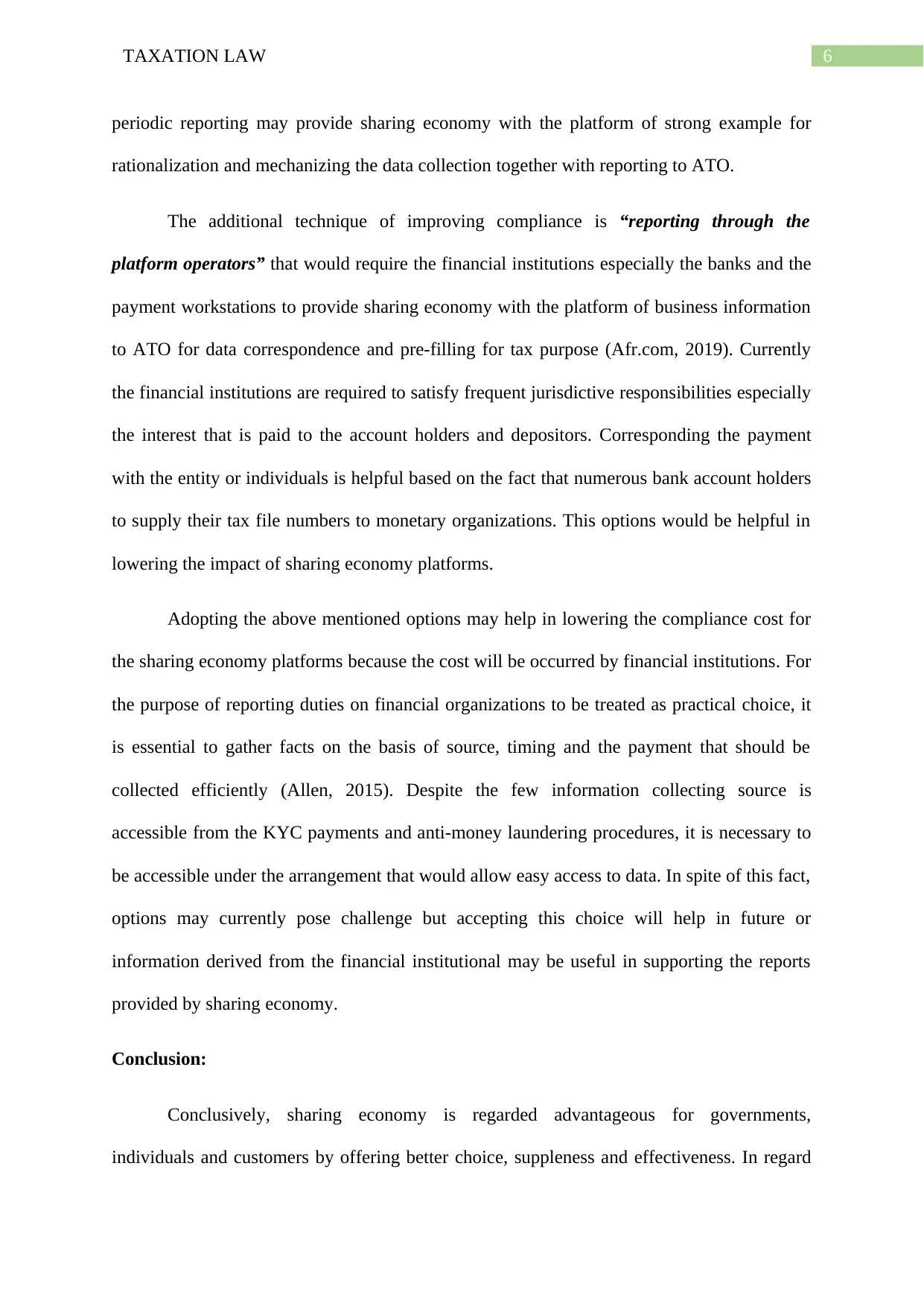
6TAXATION LAW
periodic reporting may provide sharing economy with the platform of strong example for
rationalization and mechanizing the data collection together with reporting to ATO.
The additional technique of improving compliance is “reporting through the
platform operators” that would require the financial institutions especially the banks and the
payment workstations to provide sharing economy with the platform of business information
to ATO for data correspondence and pre-filling for tax purpose (Afr.com, 2019). Currently
the financial institutions are required to satisfy frequent jurisdictive responsibilities especially
the interest that is paid to the account holders and depositors. Corresponding the payment
with the entity or individuals is helpful based on the fact that numerous bank account holders
to supply their tax file numbers to monetary organizations. This options would be helpful in
lowering the impact of sharing economy platforms.
Adopting the above mentioned options may help in lowering the compliance cost for
the sharing economy platforms because the cost will be occurred by financial institutions. For
the purpose of reporting duties on financial organizations to be treated as practical choice, it
is essential to gather facts on the basis of source, timing and the payment that should be
collected efficiently (Allen, 2015). Despite the few information collecting source is
accessible from the KYC payments and anti-money laundering procedures, it is necessary to
be accessible under the arrangement that would allow easy access to data. In spite of this fact,
options may currently pose challenge but accepting this choice will help in future or
information derived from the financial institutional may be useful in supporting the reports
provided by sharing economy.
Conclusion:
Conclusively, sharing economy is regarded advantageous for governments,
individuals and customers by offering better choice, suppleness and effectiveness. In regard
periodic reporting may provide sharing economy with the platform of strong example for
rationalization and mechanizing the data collection together with reporting to ATO.
The additional technique of improving compliance is “reporting through the
platform operators” that would require the financial institutions especially the banks and the
payment workstations to provide sharing economy with the platform of business information
to ATO for data correspondence and pre-filling for tax purpose (Afr.com, 2019). Currently
the financial institutions are required to satisfy frequent jurisdictive responsibilities especially
the interest that is paid to the account holders and depositors. Corresponding the payment
with the entity or individuals is helpful based on the fact that numerous bank account holders
to supply their tax file numbers to monetary organizations. This options would be helpful in
lowering the impact of sharing economy platforms.
Adopting the above mentioned options may help in lowering the compliance cost for
the sharing economy platforms because the cost will be occurred by financial institutions. For
the purpose of reporting duties on financial organizations to be treated as practical choice, it
is essential to gather facts on the basis of source, timing and the payment that should be
collected efficiently (Allen, 2015). Despite the few information collecting source is
accessible from the KYC payments and anti-money laundering procedures, it is necessary to
be accessible under the arrangement that would allow easy access to data. In spite of this fact,
options may currently pose challenge but accepting this choice will help in future or
information derived from the financial institutional may be useful in supporting the reports
provided by sharing economy.
Conclusion:
Conclusively, sharing economy is regarded advantageous for governments,
individuals and customers by offering better choice, suppleness and effectiveness. In regard
Paraphrase This Document
Need a fresh take? Get an instant paraphrase of this document with our AI Paraphraser
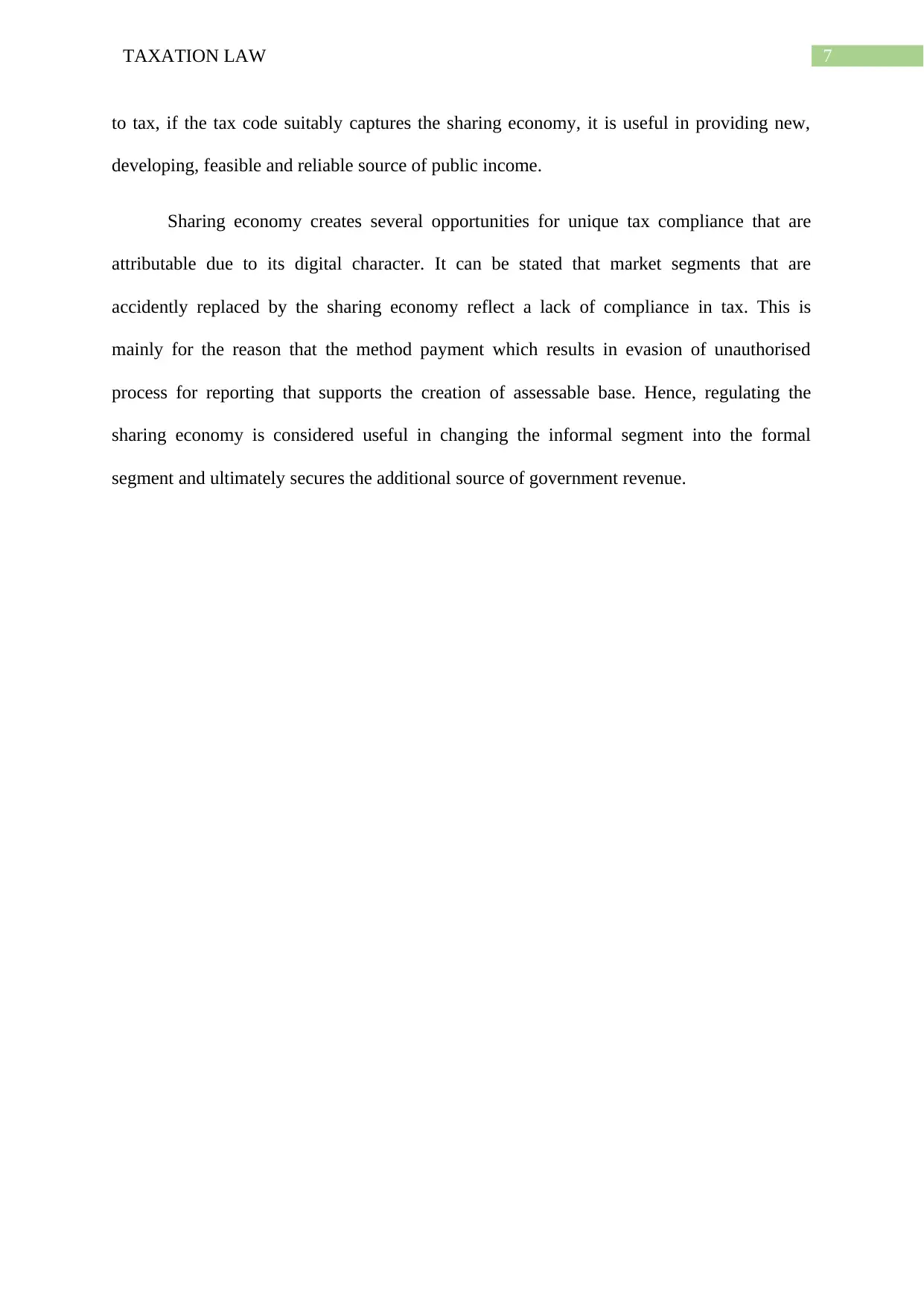
7TAXATION LAW
to tax, if the tax code suitably captures the sharing economy, it is useful in providing new,
developing, feasible and reliable source of public income.
Sharing economy creates several opportunities for unique tax compliance that are
attributable due to its digital character. It can be stated that market segments that are
accidently replaced by the sharing economy reflect a lack of compliance in tax. This is
mainly for the reason that the method payment which results in evasion of unauthorised
process for reporting that supports the creation of assessable base. Hence, regulating the
sharing economy is considered useful in changing the informal segment into the formal
segment and ultimately secures the additional source of government revenue.
to tax, if the tax code suitably captures the sharing economy, it is useful in providing new,
developing, feasible and reliable source of public income.
Sharing economy creates several opportunities for unique tax compliance that are
attributable due to its digital character. It can be stated that market segments that are
accidently replaced by the sharing economy reflect a lack of compliance in tax. This is
mainly for the reason that the method payment which results in evasion of unauthorised
process for reporting that supports the creation of assessable base. Hence, regulating the
sharing economy is considered useful in changing the informal segment into the formal
segment and ultimately secures the additional source of government revenue.
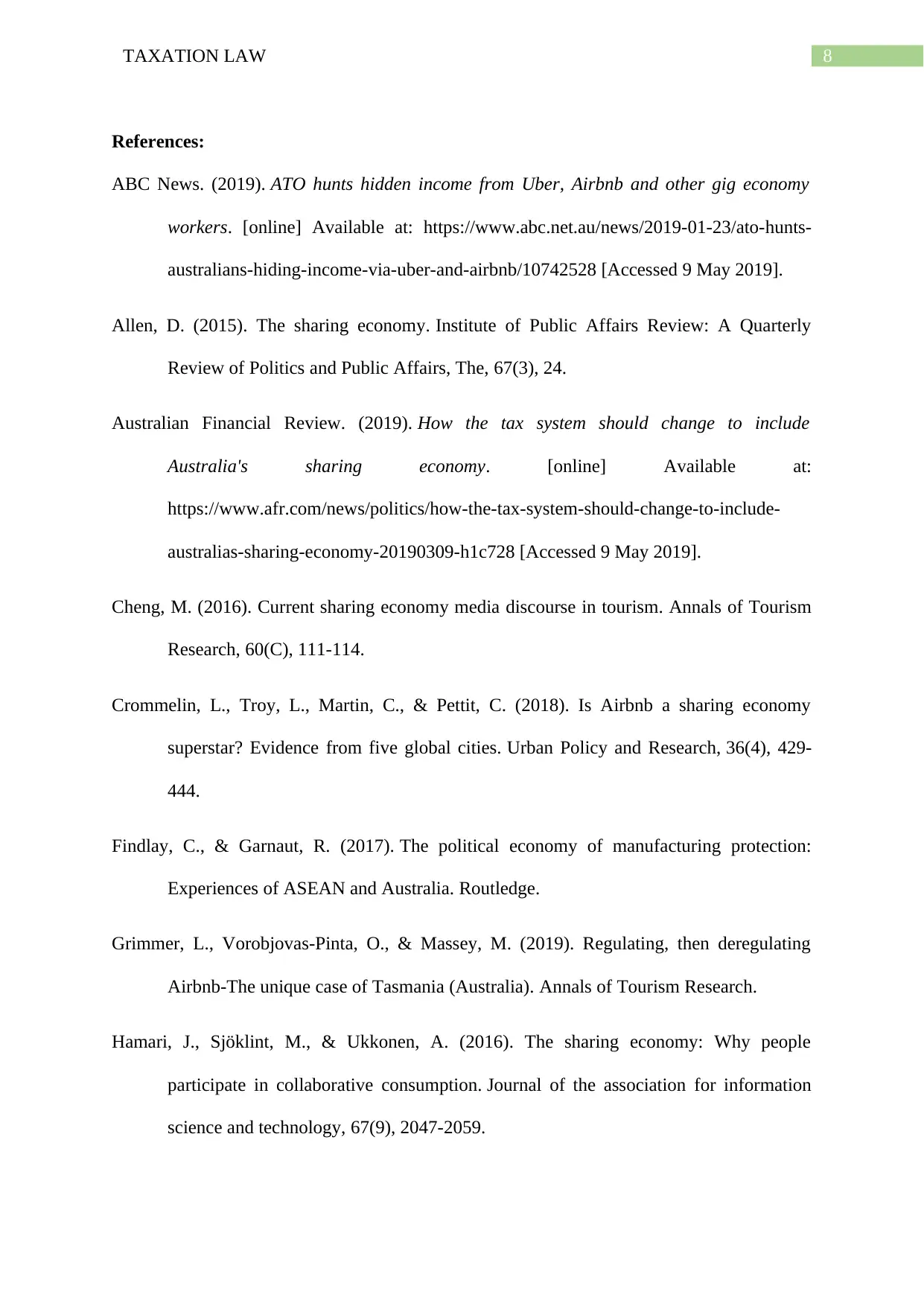
8TAXATION LAW
References:
ABC News. (2019). ATO hunts hidden income from Uber, Airbnb and other gig economy
workers. [online] Available at: https://www.abc.net.au/news/2019-01-23/ato-hunts-
australians-hiding-income-via-uber-and-airbnb/10742528 [Accessed 9 May 2019].
Allen, D. (2015). The sharing economy. Institute of Public Affairs Review: A Quarterly
Review of Politics and Public Affairs, The, 67(3), 24.
Australian Financial Review. (2019). How the tax system should change to include
Australia's sharing economy. [online] Available at:
https://www.afr.com/news/politics/how-the-tax-system-should-change-to-include-
australias-sharing-economy-20190309-h1c728 [Accessed 9 May 2019].
Cheng, M. (2016). Current sharing economy media discourse in tourism. Annals of Tourism
Research, 60(C), 111-114.
Crommelin, L., Troy, L., Martin, C., & Pettit, C. (2018). Is Airbnb a sharing economy
superstar? Evidence from five global cities. Urban Policy and Research, 36(4), 429-
444.
Findlay, C., & Garnaut, R. (2017). The political economy of manufacturing protection:
Experiences of ASEAN and Australia. Routledge.
Grimmer, L., Vorobjovas-Pinta, O., & Massey, M. (2019). Regulating, then deregulating
Airbnb-The unique case of Tasmania (Australia). Annals of Tourism Research.
Hamari, J., Sjöklint, M., & Ukkonen, A. (2016). The sharing economy: Why people
participate in collaborative consumption. Journal of the association for information
science and technology, 67(9), 2047-2059.
References:
ABC News. (2019). ATO hunts hidden income from Uber, Airbnb and other gig economy
workers. [online] Available at: https://www.abc.net.au/news/2019-01-23/ato-hunts-
australians-hiding-income-via-uber-and-airbnb/10742528 [Accessed 9 May 2019].
Allen, D. (2015). The sharing economy. Institute of Public Affairs Review: A Quarterly
Review of Politics and Public Affairs, The, 67(3), 24.
Australian Financial Review. (2019). How the tax system should change to include
Australia's sharing economy. [online] Available at:
https://www.afr.com/news/politics/how-the-tax-system-should-change-to-include-
australias-sharing-economy-20190309-h1c728 [Accessed 9 May 2019].
Cheng, M. (2016). Current sharing economy media discourse in tourism. Annals of Tourism
Research, 60(C), 111-114.
Crommelin, L., Troy, L., Martin, C., & Pettit, C. (2018). Is Airbnb a sharing economy
superstar? Evidence from five global cities. Urban Policy and Research, 36(4), 429-
444.
Findlay, C., & Garnaut, R. (2017). The political economy of manufacturing protection:
Experiences of ASEAN and Australia. Routledge.
Grimmer, L., Vorobjovas-Pinta, O., & Massey, M. (2019). Regulating, then deregulating
Airbnb-The unique case of Tasmania (Australia). Annals of Tourism Research.
Hamari, J., Sjöklint, M., & Ukkonen, A. (2016). The sharing economy: Why people
participate in collaborative consumption. Journal of the association for information
science and technology, 67(9), 2047-2059.
⊘ This is a preview!⊘
Do you want full access?
Subscribe today to unlock all pages.

Trusted by 1+ million students worldwide
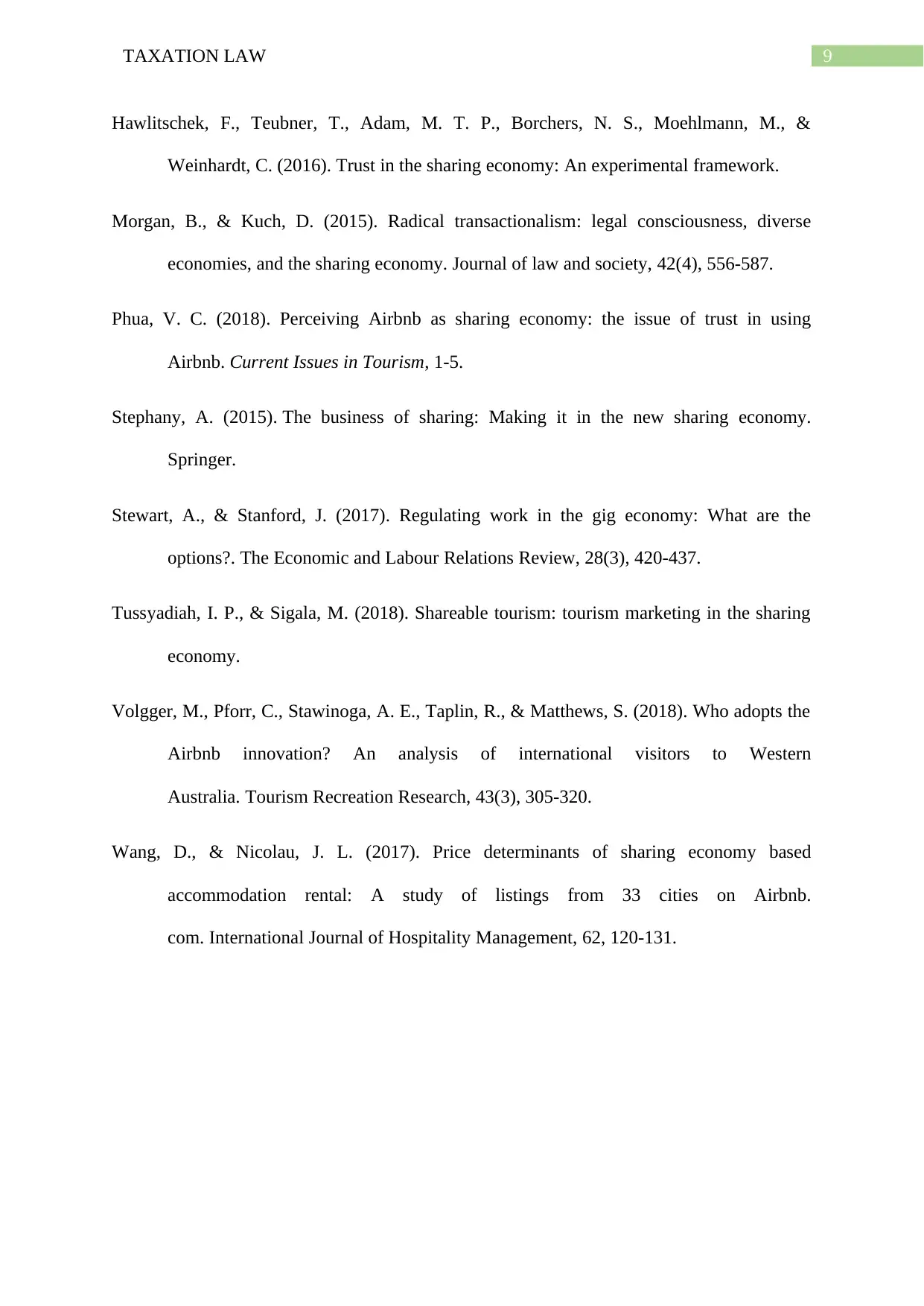
9TAXATION LAW
Hawlitschek, F., Teubner, T., Adam, M. T. P., Borchers, N. S., Moehlmann, M., &
Weinhardt, C. (2016). Trust in the sharing economy: An experimental framework.
Morgan, B., & Kuch, D. (2015). Radical transactionalism: legal consciousness, diverse
economies, and the sharing economy. Journal of law and society, 42(4), 556-587.
Phua, V. C. (2018). Perceiving Airbnb as sharing economy: the issue of trust in using
Airbnb. Current Issues in Tourism, 1-5.
Stephany, A. (2015). The business of sharing: Making it in the new sharing economy.
Springer.
Stewart, A., & Stanford, J. (2017). Regulating work in the gig economy: What are the
options?. The Economic and Labour Relations Review, 28(3), 420-437.
Tussyadiah, I. P., & Sigala, M. (2018). Shareable tourism: tourism marketing in the sharing
economy.
Volgger, M., Pforr, C., Stawinoga, A. E., Taplin, R., & Matthews, S. (2018). Who adopts the
Airbnb innovation? An analysis of international visitors to Western
Australia. Tourism Recreation Research, 43(3), 305-320.
Wang, D., & Nicolau, J. L. (2017). Price determinants of sharing economy based
accommodation rental: A study of listings from 33 cities on Airbnb.
com. International Journal of Hospitality Management, 62, 120-131.
Hawlitschek, F., Teubner, T., Adam, M. T. P., Borchers, N. S., Moehlmann, M., &
Weinhardt, C. (2016). Trust in the sharing economy: An experimental framework.
Morgan, B., & Kuch, D. (2015). Radical transactionalism: legal consciousness, diverse
economies, and the sharing economy. Journal of law and society, 42(4), 556-587.
Phua, V. C. (2018). Perceiving Airbnb as sharing economy: the issue of trust in using
Airbnb. Current Issues in Tourism, 1-5.
Stephany, A. (2015). The business of sharing: Making it in the new sharing economy.
Springer.
Stewart, A., & Stanford, J. (2017). Regulating work in the gig economy: What are the
options?. The Economic and Labour Relations Review, 28(3), 420-437.
Tussyadiah, I. P., & Sigala, M. (2018). Shareable tourism: tourism marketing in the sharing
economy.
Volgger, M., Pforr, C., Stawinoga, A. E., Taplin, R., & Matthews, S. (2018). Who adopts the
Airbnb innovation? An analysis of international visitors to Western
Australia. Tourism Recreation Research, 43(3), 305-320.
Wang, D., & Nicolau, J. L. (2017). Price determinants of sharing economy based
accommodation rental: A study of listings from 33 cities on Airbnb.
com. International Journal of Hospitality Management, 62, 120-131.
1 out of 10
Related Documents
Your All-in-One AI-Powered Toolkit for Academic Success.
+13062052269
info@desklib.com
Available 24*7 on WhatsApp / Email
![[object Object]](/_next/static/media/star-bottom.7253800d.svg)
Unlock your academic potential
Copyright © 2020–2026 A2Z Services. All Rights Reserved. Developed and managed by ZUCOL.





